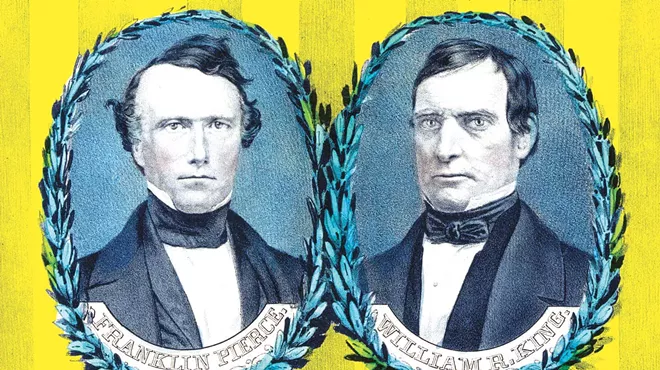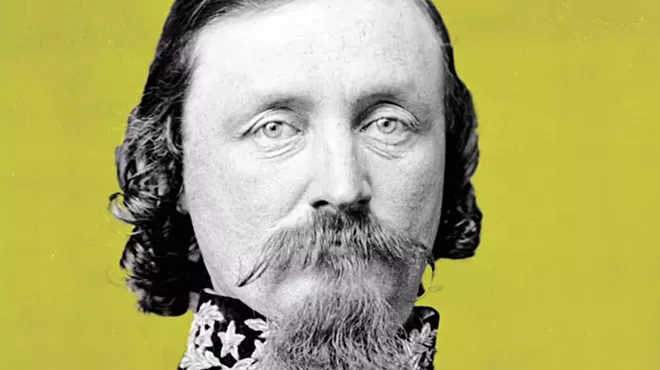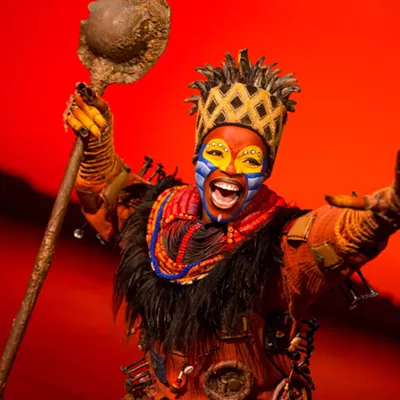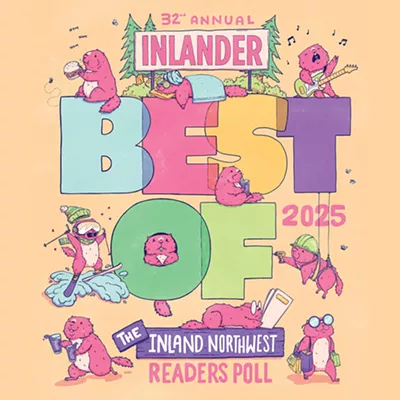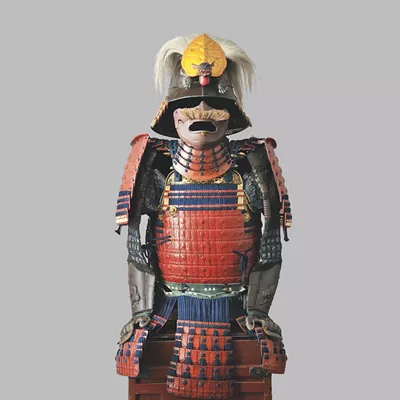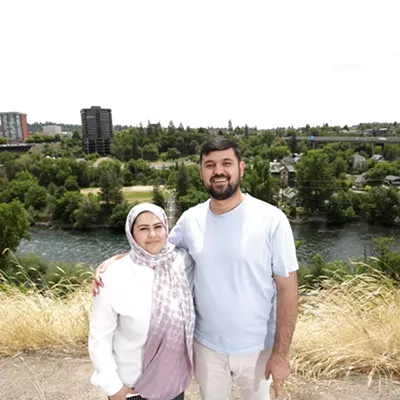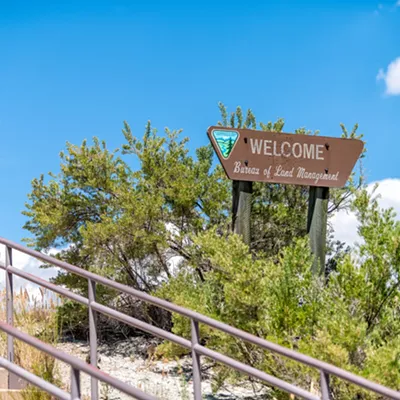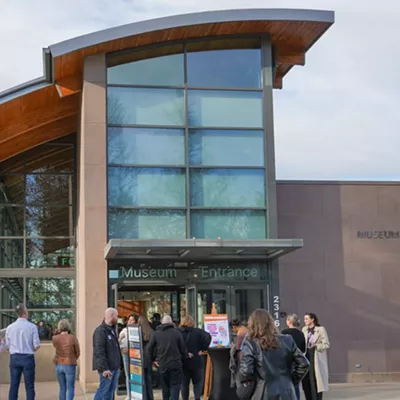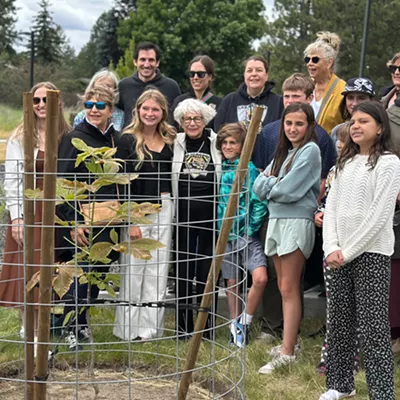
Col. George Wright rained genocidal terror on local Native peoples, yet the ruthless man is still the namesake of Spokane's Fort George Wright Drive some 160 years later.
For those familiar with history, the name Wright invokes the merciless hanging of 17 chiefs and warriors along present-day Hangman Creek, the destruction of the tribe's vital food caches and the slaughter of hundreds upon hundreds of their horses along the Spokane River banks, turning the crystal-clear waters a deep, bloody red. After being called to the region in 1858 on a punitive mission to quell Native tribes defending their homeland from encroaching White settlers, Wright's cruelty left a horrific trail of bloodshed and suffering in his wake.
Now that serious conversations have reemerged across the U.S. as to how the nation can rectify and acknowledge a foundation built on racism and White supremacist beliefs, many are wondering whether local leaders in the Inland Northwest will finally make the push to address some of the region's most painful tributes, to Wright and others.
Spokane Tribal Council Chairwoman Carol Evans and her people hope so.
"The Spokanes are the original peoples of this land. We have been here since time immemorial," Evans says. "So being the original peoples of the land and knowing what Col. Wright did — his goal was to exterminate us, to get totally rid of us, because we were, in his mind, causing problems for him or we were not in agreement to give up everything we had. ... It's not very honorable to recognize someone like him."
Local groups, including members of the Spokane Tribe, Unitarian Universalist Church of Spokane and Spokane Arm in Arm, are hosting a public rally to call for the immediate renaming of Fort George Wright Drive due to the atrocities Col. Wright committed against Native peoples of the region in 1858. The rally begins in the parking lot of Unitarian Universalist Church, and will continue with a peaceful, socially distanced walk down the street. Sat, Aug. 22 from 3-6 pm. Begins at 4340 W. Fort George Wright Drive. More details on Facebook.
Spokane City Councilwoman Karen Stratton says the council has lately doubled down on a push to rename Fort George Wright Drive. It's a topic that has been on the city planning commission's agenda for the last three to four years, she says, but has "always been at the bottom of the list due to other more pressing issues like construction."
Stratton's currently working with other council members and stakeholders including the Spokane Tribe and Spokane Falls Community College, located on Fort George Wright Drive, to expedite the name change to the top of the list. Besides the national outcry over racist and historically inaccurate legacies to the past that still exist today, renaming the street is also a personal issue for Stratton.
"I think it's important that we show future generations that there is redemption and forgiveness and survival and strength, that there is a community here willing to discuss these issues and move forward and honor our tribe," Stratton says. "I say that on a personal level because my mother was born and raised in Ford on the Spokane Indian Reservation; she was one of 12 children born and raised there. She is a tribal member and is 93 years old now."
Stratton says the city's goal is to work with Spokane tribal members to come up with a new name that appropriately recognizes and honors their culture and history.
"We'd get input from people who have been involved in the past, from our tribal elders and cultural leaders, on potential names that would be good for that specific area," tribal chairwoman Evans says.
The physical namesake of the drive, Fort George Wright, was constructed in 1896, and operated as a U.S. Army outpost named after the brutal colonel until 1957. Historic buildings from the original fort still stand today; much of its original footprint is now home to the Mukogawa Fort Wright Institute, a branch of the Japanese Mukogawa Women's University. Next door to the east is the Spokane Falls Community College campus, leaders of which Stratton says are fully supportive of changing the street name on its address.
So is the minister of Unitarian Universalist Church Spokane, located on Fort George Wright Drive near its western terminus at the intersection of Government Way. Reverend Todd Eklof has wanted to see the street renamed since moving to the area in 2011.
"I think it's really necessary given Spokane's history," Eklof says. "The name George Wright is the equivalent of a Confederate flag. It's a symbol that adds insult to centuries of injury to the First Peoples of this land. It's a name associated with grave injustices, human cruelty, bloodshed and really a level of sadism that is almost unheard of with his brutal slaughter of hundreds of horses just to cause suffering of First Peoples here."
Unitarian Universalist is co-hosting an upcoming (and socially distanced) rally on Saturday, Aug. 22, demanding the street's renaming. Titled "No Honor in Genocide," the event is planned to feature local First Nation speakers followed by a community walk down the street guided by riders on horseback.
"The real point of the event is precisely to raise public awareness around Spokane's continued, almost nonchalant honoring of a man who had such a horrible legacy in our community," Eklof adds.
Margo Hill, a professor of urban planning at Eastern Washington University and a Spokane Tribe member, is also involved in organizing the rally.
"We are happy as a people to have some recognition of how the tribes feel about the name," Hill says. "People can say, 'That is ancient history,' or 'My family didn't own slaves,' and 'My family didn't fight Indians,' but we still have to live with those atrocities. We were just protecting our homes, and George Wright is famous for saying 'I will exterminate your nations.'"
To Hill, Wright's crimes against her people mark the beginning of decades of injustices, trauma and suffering that continued for far too long.
She recalls a story of when her grandmother, who married a non-Native man, was moving into the family's new home in the city in the 1960s. Neighbors who saw Hill's grandmother being helped move in by her brown-skinned brothers caused a stir, and the sale of her grandparents' home was canceled. Hill also remembers feeling like an outcast as a child whenever her family came into town — "we were stared at in restaurants," she says — walking on the same land her people occupied for generations before White settlers pushed them off to the reservation.
"When we see the name Fort George Wright, it reminds us of those atrocities and that we are not welcome," Hill says.
Col. Wright's bloodstained legacy of hate may be the most scathing example of a poor historical tribute allowed to live on, but it's not the only remnant of oppression towards minorities and Indigenous peoples that still remains in the Inland Northwest.
Right in the heart of downtown Spokane, in a small triangular plaza between Riverside and Monroe, just outside the main entrance to the Spokane Club, is a looming homage to one past Spokane resident, John R. Monaghan.
The son of one of Spokane's early mining magnates met his untimely fate in 1899 while dispatched to the Pacific Island nation of Samoa. At the time, Germany, Britain and the U.S. each sought political and economic control of the Samoa island chain, and thus became involved in the Second Samoan Civil War. The bronze statue of Monaghan was erected years later, donated by his wealthy family to the city of Spokane in 1906.
Aside from serving as an honorary tribute to an unwelcome colonizer of the Samoan people, the monument features a bronze panel inaccurately depicting the moment of Monaghan's death with a portrayal of the Samoan defenders in a "savage" racial stereotype.
Local residents of Samoan heritage want the hurtful Monaghan tribute removed, and the complete truth shared as to why American troops were really sent to the island nation.
"This statue is not only a reminder of the atrocities committed against our people and our ancestors, but of all Indigenous people," says Kiana McKenna, a Samoan-American who holds positions with the Asian Pacific Islander Coalition of Spokane and the YWCA's Spokane Racial and Social Justice Committee.
"This statue sits on the Indigenous homelands of the Spokane Tribe and is also a stark reminder of the land stolen and the colonization that occurred here," McKenna adds.
Spokane Arts executive director Melissa Huggins says she and the Spokane Arts Commission are currently consulting with members of the region's Samoan community to determine how to address the Monaghan monument's oppressive legacy. She hopes the mayor and the City Council can help lead a productive conversation with all who have concerns about the statue's future.
"The arts commission feels strongly that the city should remove the statue, but more importantly, they want to follow the lead of the Samoan/Pacific Islander community's preference about what should be done with it," Huggins says. "Based on the conversations so far, our belief is that changing the plaque is not enough, because the statue itself represents a soldier who was sent to their country explicitly to colonize it, and that colonization was accomplished through violence against the Samoan people."
Not everyone agrees, however, that the Monaghan statue should be taken down.
Local Vietnam veteran Wes Anderson is staunchly against its removal. Anderson is a member of Spokane's Veterans of Foreign Wars (VFW) Post 51, which was named after Ensign Monaghan when the post was founded in 1915.
"To tear down the statue — no — it's part of our culture and Spokane's history," Anderson says. "My feeling is just leave it alone, it's part of this city and this country's history."
Unlike, say, the Deep South and many other states across the nation, the greater Pacific Northwest has few public monuments tied to the Confederacy. According to a database maintained by the Southern Poverty Law Center tracking nearly 1,700 monuments, schools, parks, roads and other landmarks named after Confederate sympathizers, only three remain intact in Central/Southern Idaho and two in Western Washington.
While the question of whether slavery would be allowed in the pre-statehood Western territories eventually led to the American Civil War, the broader focus of White settlers who arrived to claim the raw land was forcing its original inhabitants, Native tribes, out of the way. Many geographical landmarks thus reflected racist attitudes toward the tribes.
Until about a dozen years ago in Coeur d'Alene, for example, most people referred to Neachen Bay by the highly derogatory name "Squaw Bay." This name was widely known and used up until 2007, when local activist and longtime Coeur d'Alene resident Marlo Faulkner, working with the Coeur d'Alene Tribe, successfully lobbied for a revision of eight geographical names incorporating "squaw" across North Idaho.
"Squaw is a corruption of an Iroquois word that was used when soldiers raped or used Native women as prostitutes," Faulkner says.
She says that the bay got its original name due to actions of White soldiers posted at Fort Sherman who regularly took advantage of Native women camped in the bay, located near the present-day Gozzer Ranch golf course and housing development.
"Neachen is an anglicized version of the Salish word that means autumn hunt, and it reflects the history of the tribe because for millennia tribes from all over Northern Idaho and Eastern Washington came to the bay to hunt," Faulkner says. "Currently it's the only geographical name on the lake that is tribal, and I'm really proud of that."
Those who oppose the changing of insensitive place names and the removal of racist monuments often claim such actions are "erasing history." But critiques like what's happening now are nothing new, says local historian and Eastern Washington University professor Larry Cebula.
"We reconsider our history all the time, and that's good," Cebula says. "That means we're thinking about it and engaging our history and not taking it for granted. The American Revolution begins with tearing down a statue of King George, and nothing could be more American and wholesome than to reconsider our history with every generation." ♦

